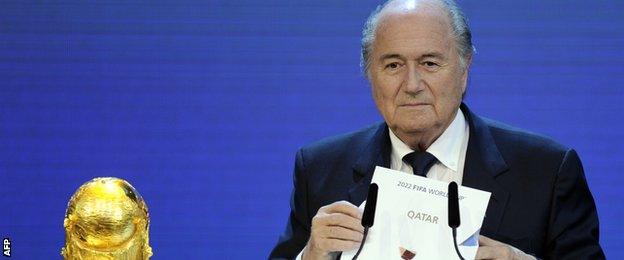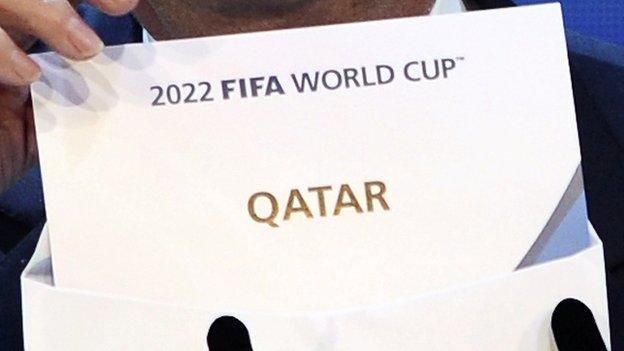2022 Winter Olympics & World Cup won't clash - IOC president
- Published
Fifa has vowed no 2022 clash - IOC
International Olympic Committee (IOC) boss Thomas Bach has insisted there must be no clash between the Winter Games and the Qatar 2022 World Cup.
January and February is being considered as a date for football's showpiece tournament because of Qatar's extreme summer heat.
IOC president Bach says he received a pledge from Fifa boss Sepp Blatter that "there will not be a clash".
"I have no reason not to believe (him)," the German told the BBC.
"He made it very clear that a clash of these two great events is in nobody's interest.
"And therefore his clear commitment was, and is, that there will not be such a clash."
Talks at Fifa headquarters in Zurich last month resulted in support for a tournament held in either January and February or November and December.
Qatar win right to host 2022 World Cup
However, Bach says there would be "no winners" if the 2022 Winter Olympics and World Cup coincided.
"A clash would be bad for the international audience who would have two major sports programmes broadcast worldwide, so the public's attention would be divided," he said.
"Also for the sponsors, there are some that are common to Fifa and the IOC. To manage these two kind of programmes at the same time would be very difficult, so in the end there would be no winners.
"The athletes and the players would not get the attention they deserve, and for all the other sponsors and broadcasters being involved it would be very, very difficult to manage.
"It's in the mutual interest that this is not happening and we have this commitment."
Bach was speaking ahead of a crucial IOC vote on his reform programme Agenda 2020, aimed at modernising the Olympics.
He wants to make the Games more affordable, and encourage more flexibility over bidding and choice of sports.
But another concern is the prospect of a rescheduled football World Cup, with Fifa looking into alternatives to a summer competition in 2022.
When asked why the Winter Games could not be shifted to accommodate a January/February World Cup, Bach said that such a move would be "very, very difficult to manage".

Fifa president Sepp Blatter has "made it very clear that a clash of these two great events is in nobody's interest," according to IOC boss Thomas Bach
He added: "Our dates, they are clear. We are committed to the future organiser and the Winter Games in particular you need to adapt to the weather conditions in a country so there is no real room to manoeuvre.
"There is a situation which is not easy for football, and reading recent statements by the secretary-general and president of Fifa they realise that their situation at this moment is not the easiest one, and I think they will address this and hope they will address this at their next board meeting."
Fifa has endured another weekend of damaging headlines surrounding the bidding for the 2018 and 2022 World Cups.
The 2018 hosts Russia and 2022 hosts Qatar were cleared of wrongdoing last month by Fifa's ethics judge Hans-Joachim Eckert. But world football's governing body was then plunged into crisis when investigator Michael Garcia disowned Eckert's summary of his two-year inquiry into allegations of corruption.
Fifa is now coming under increasing pressure to publish the Garcia report in full.
The IOC has spent much of the last decade recovering from its own bribery scandal, external over the award of the 2002 Winter Games to Salt Lake City in the United States.
"I think nowadays you don't get any trust anymore, you have to earn trust every day, and this is the way we approach it in the IOC and I'm sure that also Fifa will work hard in this direction," said Bach.
"It's not for me to give advice to Fifa over the media. They know what they have to do to get this inquiry to an end as soon as possible, and then present the results and the reason for this result to the public. I think this is crucial."
- Published5 November 2014

- Published2 October 2014
- Published30 November 2014